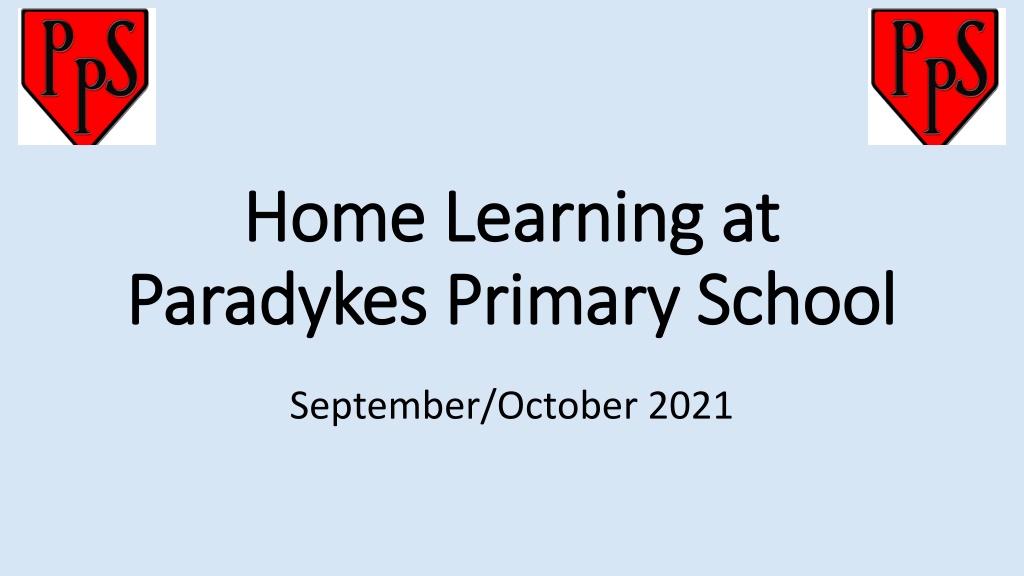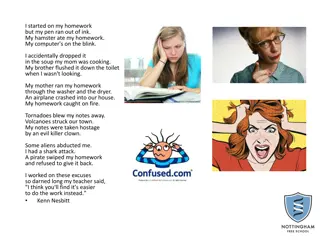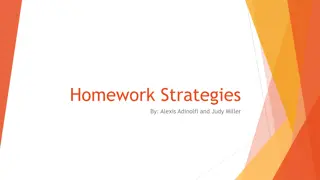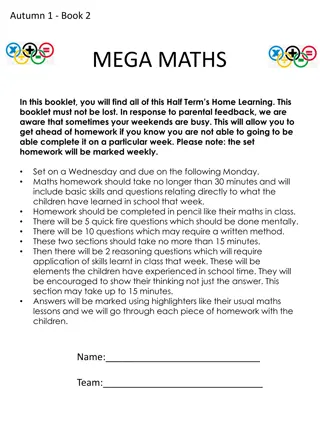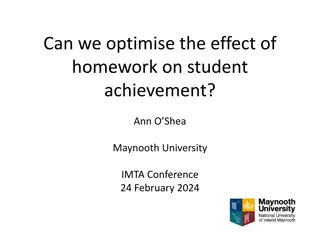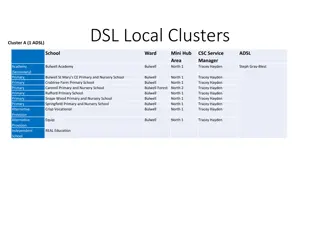Challenges and Perspectives on Homework in Primary Schools
In this collection of insights from students at Paradykes Primary School, there is a strong sentiment against homework, with pupils expressing fatigue, pressure, and lack of enthusiasm for tasks done outside of school hours. The content highlights the challenges students face with homework, the varying levels of parental involvement, and the impact on learning retention and emotional well-being.
Download Presentation

Please find below an Image/Link to download the presentation.
The content on the website is provided AS IS for your information and personal use only. It may not be sold, licensed, or shared on other websites without obtaining consent from the author. Download presentation by click this link. If you encounter any issues during the download, it is possible that the publisher has removed the file from their server.
E N D
Presentation Transcript
Home Learning at Home Learning at Paradykes Paradykes Primary School Primary School September/October 2021
What do you learn about at school? I don t know why the teacher teaches us weird things when we re only kids. P1 Playing outside Sounds Buddies Sharing Be kind Be safe No hurting or biting Reading Complicated things Numbers Letters Sentences Friendship Playing outside Making dragons French Writing stories Planning first, then tomorrow we will write sentences! P2
What do you learn about at home? Listen to Mum Numbers Eating food Reading books New things on TV I do letters so I m good at them at school. P1
What do you like to do after school? Play! Play with brothers and sisters Go to the park Go to the toy shop Arts and crafts Go to Sunshine and Lollipops Play with toys Watch telly Go to see friends Play the piano Play games Play with worms! P1
Generally our pupils are not fans of homework ! After school we re tired! P6 We get six hours of school after school we should be able to go out and have fun. P7 When we get home from school our brain has switched off. It s hard to switch it back on again for homework. P7 Home is a chilled out place. Introducing homework makes it feel like a school, and with more distractions. P7 It s too much pressure in our free time I cry over it. P7
Generally our pupils are not fans of homework continued! Work at home is worse we just want it done. P6 It doesn t help at all, I don t get better. P6 I shouldn t do sounds and numbers at home, I do them at school every day. P1 Not everyone at home is always able to help because of different family circumstances. P7 We work too hard during school time. P7 Sometimes we have to help at home and don t have time. P7
In Primary Primary 6, almost every single child an argument argument with a parent over homework. every single child has had We need help from parents, sometimes they don t know how to help. Your parents might try to teach you a different way. You might rush homework to do other things. When we surveyed parents and carers in March, 2020, we learned that 18% of our children often become upset during homework tasks, and 42% sometimes become upset. We might forget what we ve learned in class.
In P6/7 alone In P6/7 alone, these are all the clubs and activities the children do after school. Some people have clubs after school and no time to do homework. P7 Hockey Football Drumming Boys Brigade Church Gymnastics Skiing Dancing Music lessons (piano and cornet) Horse riding Religious school Drama Scouts Ice skating Rugby Guides Cheerleading Rock climbing If we have clubs, we have to do our homework really late at night. P7
Our teachers views match the childrens It can create stress for families. Some might not have adults at home who help them to complete their homework. You are never sure how its being taught at home. It takes up time when they can be developing/applyi ng different skills at home/clubs. Children have worked all day and when they go home it forces them to go back in to academic mode.
and have this to add -It widens the gap for children. - Often the children who need to practise their learning more at home are the ones who don't get the support from home. - If children don't do it they can be a step behind when working in class. - The preparation doesn t match the quality and quantity you receive, often with a very small percentage of the class completing work. It can make children stress/worry if they have not completed homework which is not how I want children to feel coming to school.
With some children it takes the fun away from reading- always seen as something that NEEDS to be done rather than something they can enjoy.
Some children see homework as important. It helps us to remember what we ve already learned. P7 It gives me something to do so I don t need to play with my sister. P5 It helps us learn. P1 It s good to learn. P1 It can be calming to do alone. P5
Teachers recognise these as the benefits of home learning It helps to engage and involve parents in their child's learning and encourages discussion at home about learning. Children get the opportunity to consolidate learning that has taken place in class, and children get to further practise the skills needed within lessons. It allows interested adults at home to keep in touch with what is being taught. It can be an opportunity for family bonding. It ensures that it keeps some children occupied with something as they might not have anything else to do at home. For some children completing their homework is something that they take great pride in and feel excited about.
When should you get homework? Not at the weekend, that s when we play with our friends. P5 Not over a weekend, it s OK on weekdays though. P7 We want to spend time with our families at the weekend. P7 Our parent/carer survey showed that 57% would prefer homework to go out on a Monday and be returned on a Friday. Only from Tuesday to Friday. P5
Something not too easy and not too hard. P4 What kind of homework would you like? Reading for enjoyment - P7 Problem solving P6 Maths games on a device P6 Art P6 Languages P6 Coding P6 Your own choice P6 Reading stories and school books P2 Science experiments P7, P5 Challenges, like the morning challenge P5 ICT P5 Spelling P5 Maths basics, like tables and division P5 Reading where we choose own books P5 Art, where school provides resources P5 Life skills P7 Practising things we already know P7
What would your ideal home learning look like? - Reading for enjoyment - Optional personal projects with free choice of topic - Reading practice, depending on ability - Suggestions of maths websites or game ideas for home - Sharing home learning in class - Tricky words to be used as extra support - Trips to the library to choose own books Infants are a bit different - Basic number revision and tasks linked to daily life and routines - Recognising and writing sounds and tricky words - Listening to and discussing lots of stories
Whats next? A group of parents and teachers to meet to create homework policy. Please email Lynsey at L.Stewart5@midlothian.education if you are interested in being part of this.
